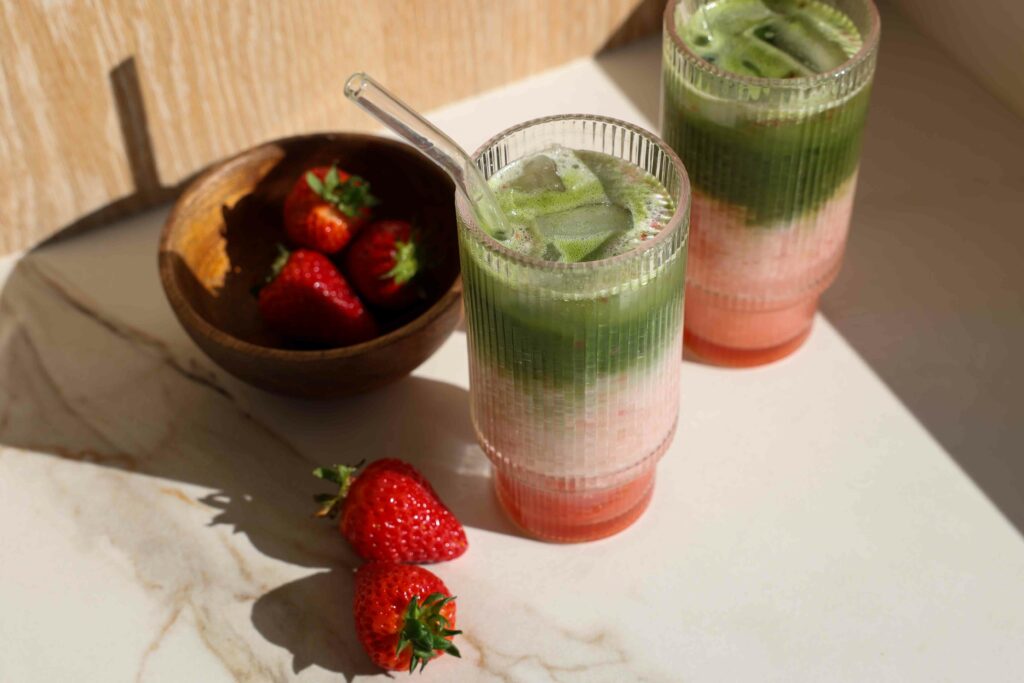Is Matcha Your Morning Upgrade?
24 Apr 2025
“A coffee a day keeps the doctor away!”
…is what I tell myself as I order my coffee on my mid-morning break. Or is it? Whatever it does, it keeps me alert, awakens my taste buds, and gets my day off to a good start, most of the time. But it’s not all green, shall we say.
Amongst the coffee scene, there’s a new guy on the block, dividing coffee connoisseurs everywhere: Matcha. Green and glorious, this Japanese powder is taking the coffee game by storm. But why are people choosing matcha over our old, reliable friend, coffee?
The Caffeine Connection
In essence, both coffee and matcha share one key element: caffeine. There’s a chemical in your brain that works like a dimmer switch, gradually turning the lights down to tell your body it’s time to rest. Caffeine jumps in and turns the lights back up, keeping things bright and active. The stronger the caffeine, the brighter the switch. As the caffeine wears off, the lights dim again, letting your body prepare for rest.
Enter: Matcha
Matcha, as mentioned, is a green powder that comes from the matcha plant and has been consumed in Japan for centuries. Its popularity in the Western world has skyrocketed in the past few years. Many assume a long list of health benefits, largely due to the idea that anything green must be healthy. Anecdotal evidence, alongside some emerging clinical trials, suggests that actually, matcha may result in less anxiety compared to coffee and improved cognitive focus.
This is mainly due to the fact that matcha contains about 30% of the caffeine found in a regular café coffee. Matcha also contains a compound called L-theanine (calming amino acids) along with various types of catechins (powerful antioxidants). This combination (less caffeine + calming L-theanine) means that enjoying a matcha may offer a gentler, sustained energy boost and calm focus throughout the day, compared to the jolts, peaks, and crashes coffee can sometimes bring. Compared to our light switch analogy, matcha acts more as a dimmer switch calmly bringing the lights up and having a warm soft light on for the day, instead of flicking the harsh big lights on and later potentially blowing a fuse!Catechins on the other hand, offer a range of health benefits, from antioxidant protection to potential cardiovascular support, and may reduce oxidative stress.
Many people also report that:
- Their sleep is less affected by matcha than coffee
- Their digestive system feels calmer — a claim supported by a recent study in older adults. As it’s lower in caffeine, pregnant women can also enjoy one cup a day. So yes, the health hype around matcha does have some merit.
Like any health claim, for a dietitian or health professional to confidently stand behind it, we need evidence-based science. In matcha’s case, the studies are still limited. Our current knowledge comes from:
- Anecdotal reports
- Educated guesses
- A few interesting but small or limited studies
The evidence for coffee however is much more established, and I hope and expect matcha to follow suit. Over the years, many studies have linked coffee consumption with a reduced risk of type 2 diabetes (as noted in the BMJ, 2022), potential protective effects for liver and heart health, and more.
For both coffee and matcha, context is important: are you seeking an energy boost because you are not sleeping through the night? Or are you just not able to put your finger on why you are so tired? In which case, neither coffee nor matcha is your answer. Going back to the basics such as ‘am I sleeping enough, am I eating enough, am I overworked or overtrained, am I hydrated, and is my diet varied?’ is key. If any of those areas are lacking, address them and then consider getting a medical check-up. Filling your body with coffee is a band-aid over a bigger problem of being chronically fatigued, and that should be addressed first.

Things to note for both:
Ideally, caffeine of any source shouldn’t be consumed on its own first thing in the morning, particularly if heading straight into high intensity exercise. But if you choose to, serve it with a protein-containing milk like soy or cow’s milk. In the morning, particularly for women, cortisol levels are high, so it’s best to allow them about 60 minutes to settle before increasing further with caffeine. Therefore, in these instances when you need your morning hit, Matcha is likely a better option as it is lower in caffeine.
If having a mid-day coffee, again, choosing to have either protein-containing milk or a snack on the side can help to minimise potential hormonal disruption, ease tummy irritation, and support blood sugar stability.
Fruit-flavoured iced matcha drinks like strawberry matcha are increasingly popular, but be mindful that the fruit compotes at the base of these drinks will increase the sugar content …. though they are certainly tasty!
So, what’s the verdict?
For me, I will remain a mostly coffee aficionado and enjoy a matcha here and there. Lucky for me, coffee doesn’t give me anxiety, it’s cheaper, faster, and I prefer how it tastes. But there are days I might consciously swap this out for matcha and note how I feel.
If you have a balanced diet, you’ll get antioxidants from the fruit and vegetables in your meals. But if you feel like you need a boost, and coffee makes you jittery, gives you a crash, affects your sleep, or you’re just trying to cut down on caffeine, Matcha is a great option with some promising potential benefits.
Generally speaking, matcha and coffee are both sources of caffeine, but matcha’s antioxidant benefits, its support for calm, sustained energy, and the presence of L-theanine and catechins likely tip the scale more favourably in the pros column.
However, coffee is not something to be demonised and, like all things, can be enjoyed in moderation.
Post written by: Lorna Ryan, Registered Dietician


